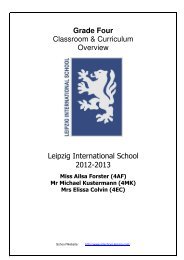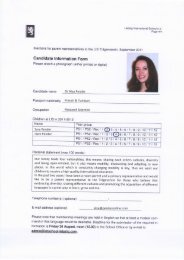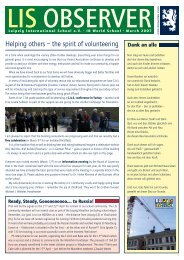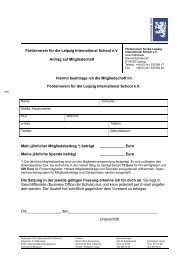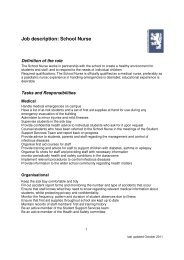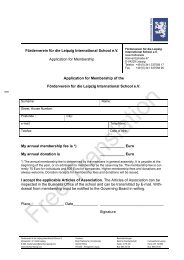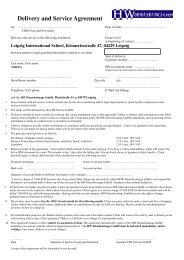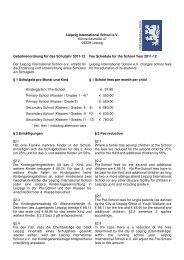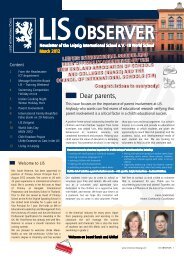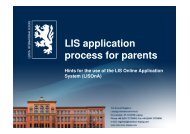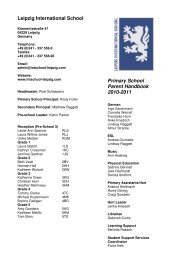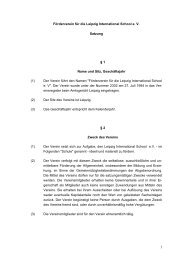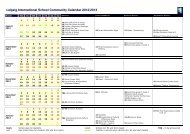(2JG) Mrs Kathleen Wolcott (2KW) Miss Ulrike Metzler - Leipzig ...
(2JG) Mrs Kathleen Wolcott (2KW) Miss Ulrike Metzler - Leipzig ...
(2JG) Mrs Kathleen Wolcott (2KW) Miss Ulrike Metzler - Leipzig ...
Create successful ePaper yourself
Turn your PDF publications into a flip-book with our unique Google optimized e-Paper software.
Spelling – Children will continue learning English spelling conventions to assist their spelling<br />
strategies. Each week we will focus on a particular sound and children will explore how to spell<br />
using that sound. We will sometimes have review weeks. The spelling words that the children must<br />
learn each week are linked to that week’s sound.<br />
MATHEMATICS:<br />
The focus in Grade Two is building and strengthening numeracy and mental Maths skills learnt in<br />
Grade One. We will be playing games and using concrete materials to help learn additional skills.<br />
There will also be opportunities to apply their knowledge to real life situations. The students will use<br />
a 1cm grid exercise book to help them learn to set out their written work neatly. The general Maths<br />
concepts taught are:<br />
Number<br />
• Place Value: numbers to at least 1000, partitioning, rounding<br />
• Addition & Subtraction: number bonds to 100, develop their own written calculations<br />
• Multiplication & Division: times tables: x1, x2, x3, x4, x5, x10, division with remainders<br />
• Fractions: recognizing fractions, simple equivalence, simple mixed fractions, ordering<br />
numbers, fractions of numbers<br />
Geometry<br />
• 2D & 3D Shapes: characteristics of shapes, nets, symmetry, right angles<br />
• Position: clockwise and anticlockwise, coordinates on a grid<br />
Measure<br />
• Money: totals to 100c, change from 100c, begin to use Euros and cents<br />
• Length, Mass, Capacity: read scales, use a ruler to the nearest half centimetre<br />
• Time: vocabulary of a clock and calendar, analogue clocks to the nearest 5 minutes, digital<br />
clocks to the nearest minute, simple time intervals<br />
Data Handling<br />
• Real life situations: tally charts, frequency tables<br />
• Graphs: pictograms (symbol representing one or two units), bar charts (intervals labeled in<br />
ones or twos), Venn or Carroll diagrams (two criteria)<br />
Problem Solving<br />
• Word problems: single (all four operations), two-step (addition and subtraction only), write<br />
own<br />
• Number problems, puzzles, patterns, simple relationships and general statements<br />
• Strategies to check answers, including estimation<br />
• Oral and written reasoning<br />
ART:<br />
There is a double period of art per week taught by the class teacher. The aim if possible is to try<br />
and complement other subjects being taught. The focus is on the<br />
elements, skills and materials used in art.<br />
Topic areas this year will include:<br />
� Understanding Colour & Investigating Pattern<br />
� Environmental Art/Sculptures<br />
INTEGRATED UNITS:<br />
Each class has 4 periods of Integrated Unit time each week. This could be a unit based on Science,<br />
History or Geography. The topics to be studied are:<br />
SCIENCE<br />
• Flowering Plants<br />
o This unit looks at what plants need to grow well and why it is important that they<br />
grow.<br />
• Materials



